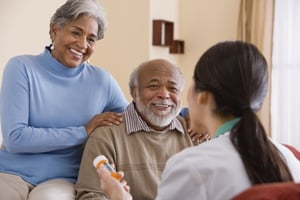An aging parent is in the emergency room after forgetting to take their medication, an elderly...
7 Tips to Prevent Seniors from Misusing Prescription Drugs
Today, the average senior is prescribed 5-6 medications for various health issues, increasing their odds of misusing prescriptions and potentially leading to extreme health risks or accidental overdoses. As the Baby Boomer population ages, the number of seniors continues to grow. Therefore, it is important to recognize if your loved one is at risk and identify tips to prevent misuse.
Recent studies have shown that the medical community is increasingly giving older patients prescriptions for extremely addictive drugs, leading to dependency. If your loved one is being prescribed new medications, it is vital to monitor their intake to prevent emergency room visits, hospitalization, or in some instances, early cases of death.
Use the following tips to help avoid drug misuse and stay in control of a loved one’s medications:
- Keep a running list of medications your loved one has been prescribed. Be sure all prescribing physicians are aware of each drug, helping them make decisions about future prescriptions.
- Organize medicine. Whether using a pill box, medication dispenser, or utilizing pharmacy services, organization can help ensure correct dosages are taken on-time.
- Discuss side-effects with your loved one’s doctor to help recognize symptoms that indicate is medications are not working properly or if your loved one is having a bad reaction.
- Pay attention to how your loved one is feeling. If they feel dazed, unwell, or have periods of semi-consciousness after taking medications, contact their doctor immediately to determine next steps.
- Know when to say ‘no’. If your loved one is showing signs of dependency or recovery, discuss changing dosages. If possible, discuss alternative methods to recover from pain or health conditions that do not involve medications.
- Track how long your loved one has been taking each medication. Some medicines lose effectiveness as patients build a tolerance, are not meant for extended use, while others may cause patients to become dependent.
- Get outside help. Home healthcare services provide medication reconciliation and management to monitor a patient’s dosages and dependency. Home care aides provide monitoring of the patient and any abnormal behavior.
Visiting Nurse Association of Ohio provides skilled nursing services and private-duty personal assistance for patients living with chronic conditions or recovering from illness or injury. Find out today if your loved one would benefit from weekly nursing visits, medication management or 24/7 care.
Call VNA of Ohio Today
Learn more about VNA of Ohio home healthcare services, or call us today at 1-877-698-6264.



